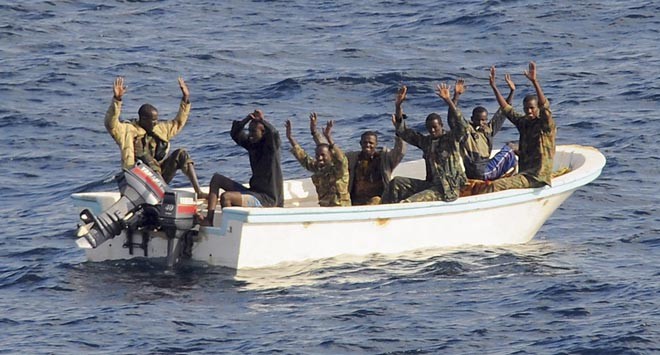Piracy, aground in the Marshalls, Antarctic Day—World Cruising news
by David Schmidt, Sail-World Cruising Editor on 11 Dec 2014

Suspected pirates keep their hands in the air as directed by sailors aboard the guided-missile cruiser USS Vella Gulf. SW
While widespread accord can be a tough thing to achieve amongst humans at times, the entire maritime community can easily agree that piracy is an absolutely intolerable act that must be stopped. The Horn of Africa draws plenty of piracy attention these days, from the high-profile attacks on massive ships such as the 'Maersk Alabama' (the story behind the fantastic film, 'Captain Phillips') to the much quieter hijackings of private yachts, and international governments have taken direct actions to stop this high-seas crime, often involving their naval power. Because of this, it seems a bit odd that the European Court of Human Rights recently found France guilty of violating the pirates’ human rights.
According to reports, Somali pirates captured the 290-foot 'Le Ponant', including 30 crewmembers (22 of whom were French nationals), as well as a 50-foot sailboat. Ransoms of some $2 million dollars were remitted to the pirates, but, in both cases, this did not lead to the immediate release of the yachts or their prisoners, so the French government sent in the commandos, who 'repatriated' both vessels in separate raids (months apart).
Problems arose, however, when it came to the captured pirates. The French military held the Somali pirates (different groups) for a period of time (less than a week in both cases) that the European Court of Human Rights deemed to be a violation of the pirates’ rights.
According to a court statement, Article 5.3 of the European Convention on Human Rights 'was not designed to give the authorities the opportunity to intensify their investigations for the purpose of bringing formal charges against the suspects'. As a result, the French government can expect to pay out thousands of euros in compensation to the pirates.
Get the full scoop, inside this issue.
Meanwhile, in the South Pacific, John Martin has provided a fascinating and heart-wrenching account of helping a stricken cruiser whose Beneteau 40 found the bricks off the island of Majuro in the Marshall Islands due to an autopilot failure. The boat was destroyed, but the experience gave Martin a rare view into the soul of a dedicated cruiser, especially after Martin and his friend Wayne helped JJ (the shipwrecked Canadian sailor) with some accommodation and some sound perspective.
'That night Wayne and I mostly just listened,' wrote Martin of their final evening with their shipwrecked friend. 'JJ told us stories about his adventures cruising as a singlehander. We learned about how he had defected from Czechoslovakia and had started a new life in Canada. Wayne and I sipped our red wine and JJ his cranberry juice, and when I served dinner he smiled, thanked me and said he finally really felt hungry. That night he explained how much he liked Majuro. 'I’ve had to start over before, and I can do it again,' he said. 'In two years, I will have another boat. I’ll be back.''
And in happier sailing news, word has emerged that the Farr-designed yacht 'Leopard of Finland' has obliterated the Atlantic Rally for Cruisers (ARC) course record, shaving two days six hours 45 minutes and 19 seconds off the passage time from Gran Canaria to Saint Lucia for a total elapsed time of eight days 14 hours, 39 minutes and 51 seconds. 'Leopard’s' crew consisted of her core group of pro sailors, commanded by skipper Chris Sherlock, and 10 Finnish adventurers that were led by Samuli Liesti, the organizer of the adventure.
'The idea came about to do a transatlantic because for so many people, including us, it is a dream come true,' said Liesti. 'It has been awesome and great pleasure to be part of such a great team. Before we started [the whole project], we said we wanted to first do a transatlantic crossing and second break the ARC Course Record. Now we have achieved these dreams.' More, inside.
And in environmental news, December 1 marked Antarctic Day and the 55th anniversary of the Antarctic Treaty, which established the Antarctic as a place for peaceful purposes and scientific discovery-not to mention a place where nuclear weapons and waste are banned. The treaty was signed by a group of 12 forward-thinking nations, a number that has now swollen to include 50 different nations.
Learn more about the Antarctic Treaty, inside this issue.
Also inside, get the latest scoop on Sail-World.com’s new format, learn about the latest instructional sailing app, and don’t miss Captain John Jamieson’s 'Top Ten' checklist for safer sailing.
May the four winds blow you safely home,
If you want to link to this article then please use this URL: www.sail-world.com/129810